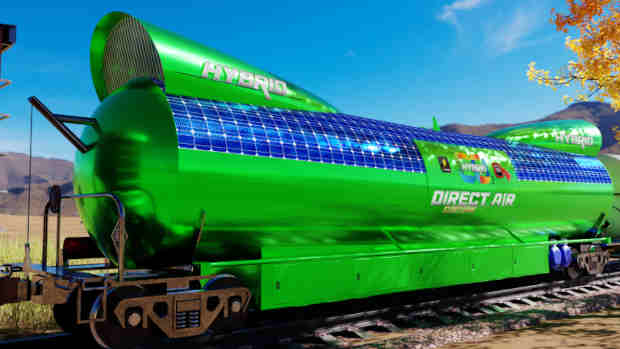In the US, the new Inflation Reduction Act (IRA) will help implement innovative climate solutions, including a potential rail car that will capture carbon as it travels and require no additional external energy.
The law, among other things, aims to promote green technologies with $369 billion in federal seed money, according to The New Stack.
The ultimate goal of the law is to reduce greenhouse gas emissions by approximately one gigatonne by 2030, and achieve zero emissions by 2050 at the latest.
Its idea is to make experimental ecological energy solutions and fantastic ideas more appetizing for financing by investors.
The Texas-based CO2 Rail Company is working on a rail car that will capture carbon as it moves. The air intake valves are directed towards the fluid flow created by the train. The entire system will work due to regenerative energy returned from the train's brakes, that is, it will not require additional external energy.
The new law more than triples the tax credit companies get for removing carbon from the air, from $50 a ton to $180, while lowering the qualifying threshold from 100,000 tons to just 1,000. This should make it easier for carbon capture startups to attract investors.
There is also funding for futuristic technologies that have yet to prove their viability.
For example, there is $280 million for research into fusion energy, which could theoretically recreate the molecular processes that power the sun.
The Act also expands credits for geothermal energy research. Water is pumped deep into the ground, where natural heat turns it into steam. It rises back into the turbine, which generates energy.
The energy of superheated rocks is a potentially limitless source of emission-free energy, although it will require future engineering advances.
However, the IRA sent a specific signal to early-stage investors by including geothermal tax credits.
Time magazine noted that the Inflation Reduction Act is less about government spending power and more about private sector power.
"The tax incentives, loans, and grants at its center are all intended to nudge the private sector to go faster in deploying existing technologies like wind and solar while also advancing future technologies," Time said.
Changing perspectives
The article noted that other startups appreciated that the Act offers a wide range of support not only for clean energy solutions, but also for combating the effects of climate change.
"we’re thrilled to see $4 billion directed to aiding the Western States currently grappling with a very difficult drought, a challenge we at Epic are actively addressing," said Aaron Tartakowski, CEO of Epic Cleantec, which develops water recycling systems.
The Act will also provide funding for flood protection and storm resilience of affordable housing. There are even grants to protect transportation projects from extreme heat and flooding.
In addition, the IRA provides money for reducing emissions at energy-intensive industrial enterprises in the production of iron, steel, aluminum, cement, concrete, glass, industrial ceramics, etc.
There is also funding for neighborhoods to improve accessibility, safety and transportation.
The law provides $1.5 billion to fund the planting of trees alone, because they absorb carbon from the air and cool the surrounding air.
The White House plans to create community and urban forests and expand green spaces in cities to fight climate change, lower energy bills and reduce heat-related deaths and illnesses.
There is also funding for more traditional technologies. The law provides a quarter of a trillion dollars in loans through the Department of Energy to retrofit aging energy infrastructure, such as power lines, refineries and power plants, for a net-zero economy.
The law would also help 280,000 farmers and ranchers implement conservation practices on about 125 million acres of land. Namely, to implement practices that recognize the valuable role that lands play in combating the climate crisis. By reducing greenhouse gas emissions and increasing carbon sequestration in the soil, the White House believes it will also make agricultural activities more productive
The Inflation Reduction Act would lead to the construction of up to 950 million new solar panels, 120,000 wind turbines and 2,300 grid-connected power plants.
The law also encourages families to go green by offering households thousands of dollars in rebates for new and efficient appliances, tax credits for heat pumps and rooftop solar, and appliances.
The legislation included a limit on the total rebate of $14,000, and it is limited to households with incomes up to 150% of the median income in their area. But it will allow 1 million low- and middle-income households to switch to electricity.
The article noted that Microsoft co-founder Bill Gates insisted on the adoption of this draft law.
Earlier, EcoPolitic wrote, that in the USA the Senate approved the bill, which provides more than $400 billion in investments to fight climate change, reduce inflation and improve access to health care over 10 years.
As EcoPolitic previously reported, US President Joe Biden announced the allocation of $2.3 billion to help build infrastructure that can withstand extreme weather conditions and natural disasters.





